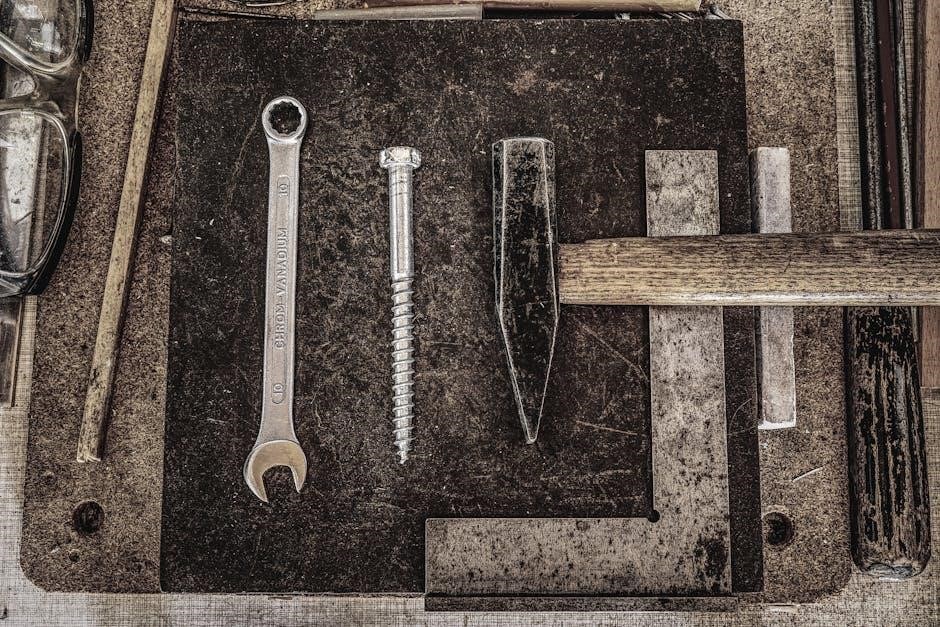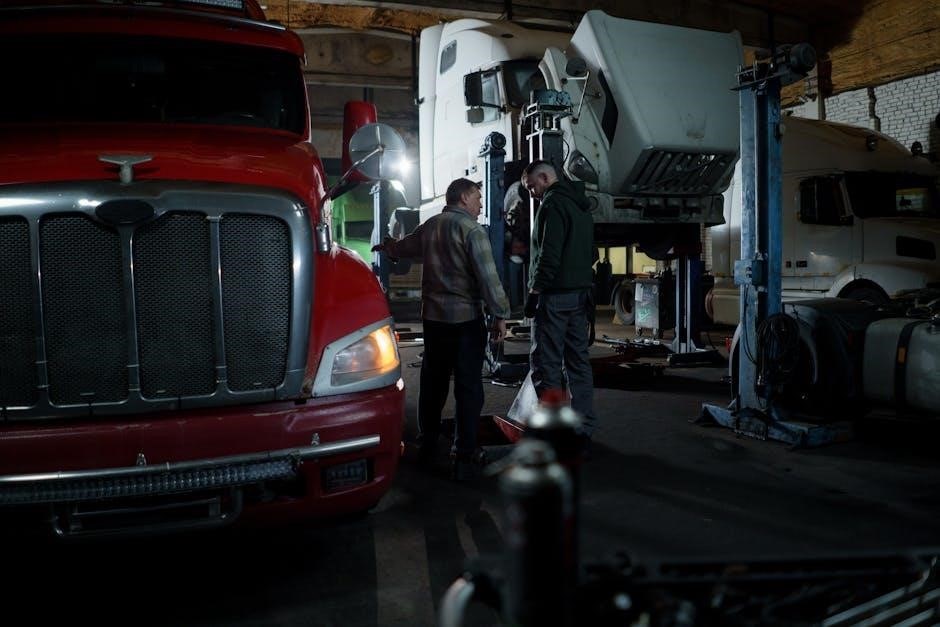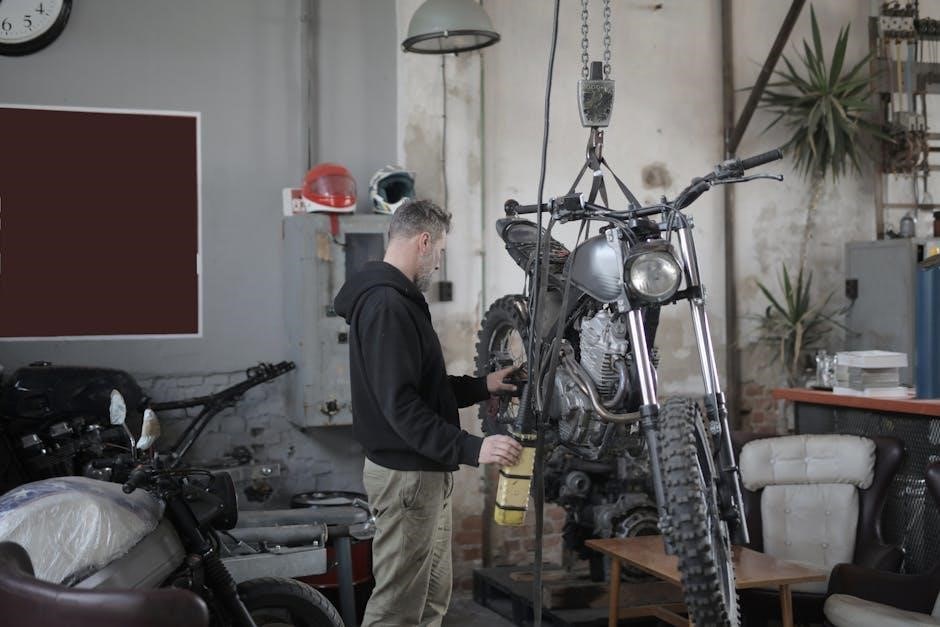
mercruiser maintenance manual
Welcome to the Mercruiser Maintenance Manual, your comprehensive guide to proper boat engine care. This manual provides essential instructions for operation, routine maintenance, and troubleshooting to ensure safety and efficiency.
1.1 Importance of Regular Maintenance
Regular maintenance is crucial for ensuring the reliability, performance, and longevity of your Mercruiser engine. It prevents costly repairs, enhances safety, and maintains optimal efficiency. Routine checks, fluid management, and component inspections help identify issues early, preventing downtime. Proper upkeep also ensures compliance with environmental regulations and preserves your engine’s value. Always follow the recommended schedule for a trouble-free boating experience.
1.2 Overview of the Manual Structure
This manual is organized into clear sections to guide users through essential maintenance procedures. It begins with an introduction, followed by general maintenance practices, engine-specific guidance, and detailed sections on stern drive, electrical systems, troubleshooting, and seasonal care. Each chapter is designed to provide step-by-step instructions, ensuring a logical flow of information for both novice and experienced users.

General Maintenance Procedures
Regular checks, fluid inspections, and belt tension adjustments are essential. These procedures ensure optimal performance, prevent wear, and extend the lifespan of your Mercruiser engine and components.
2.1 Routine Checks and Inspections
Regular inspections are crucial for identifying potential issues early. Check fluid levels, belt tension, and sacrificial anodes. Inspect electrical connections and engine components for wear or corrosion. Ensure all systems function properly before operation. Perform these checks seasonally or as recommended to maintain reliability and extend the lifespan of your Mercruiser engine and stern drive system.
2.2 Fluid Management and Replacement
Proper fluid management ensures optimal engine performance. Use Mercruiser-recommended oils, such as SAE 20W-40 or 25W-40 synthetic. Regularly check coolant, transmission, and hydraulic fluid levels. Replace engine oil every 50-100 hours and coolant every 2-5 years. Inspect the seawater pump housing for corrosion and replace it as needed. Always follow the manual’s guidelines for fluid capacity and type to prevent damage and corrosion.
2.3 Belt Tension and Replacement
Proper belt tension is crucial for reliable engine operation. Inspect the serpentine belt annually for cracks, fading, or wear. Replace worn belts immediately to prevent engine damage. Use only genuine Mercury parts to ensure compatibility. Maintain correct tension as specified in the manual to avoid slippage and premature wear. Regular replacement ensures optimal performance and longevity of your Mercruiser engine.

Engine-Specific Maintenance
Engines vary by size and type, requiring tailored maintenance. Follow guidelines for 3.0L, 4.3L, 5.0L/5.7L, and V8 engines to ensure optimal performance and longevity. Regular oil changes, filter replacements, and cooling system checks are essential for reliable operation. Proper lubrication and belt tension maintenance are also critical for engine durability and efficiency.
3.1 Maintenance for 3.0L Engines
Regular maintenance for 3.0L engines includes checking oil levels, inspecting sacrificial anodes, and replacing filters. Use SAE 20W-40 or 25W-40 synthetic oil for optimal performance. Inspect belts for wear and ensure proper tension to avoid engine damage. Follow the manual’s guidelines for spark plug replacement and cooling system checks. Always use genuine Mercury parts for reliability and longevity. Proper maintenance ensures consistent power and efficiency.
3.2 Maintenance for 4.3L Engines
For 4.3L engines, routine maintenance includes oil changes using SAE 20W-40 or 25W-40 synthetic oil. Inspect belts for wear and ensure proper tension. Replace fuel filters and spark plugs as recommended. Check coolant levels and inspect sacrificial anodes, especially in saltwater conditions. Use genuine Mercury parts for reliability. Regular maintenance ensures consistent performance and extends engine lifespan, delivering solid power for recreational boating.
3.3 Maintenance for 5.0L/5.7L Engines
For 5.0L and 5.7L engines, regular maintenance involves oil changes with SAE 20W-40 or 25W-40 synthetic oil. Inspect spark plugs and replace them every 100 hours. Check coolant levels and flush the system every 2 years. Ensure proper belt tension and replace worn belts. Inspect sacrificial anodes annually, especially in saltwater. Use genuine Mercury parts for optimal performance and reliability, ensuring these engines remain powerful and efficient for years.
3.4 Maintenance for V8 Engines
For V8 engines, prioritize regular oil changes using Mercury-recommended synthetic oil. Replace spark plugs every 100 hours and inspect exhaust manifolds for corrosion. Check coolant levels and flush every 2 years. Inspect sacrificial anodes annually, especially in saltwater. Use genuine Mercury parts for replacements to maintain performance. Ensure proper torque specifications for engine bolts during service for optimal reliability and longevity.

Stern Drive and Alpha Drive Maintenance
Regular maintenance of stern drive and Alpha drive systems ensures smooth operation. Inspect for corrosion, lubricate moving parts, and address common issues promptly to prevent costly repairs.
4.1 Inspection and Lubrication
Inspect stern drive and Alpha drive components for corrosion and wear. Lubricate all moving parts regularly to ensure smooth operation and prevent premature wear. Use marine-grade lubricants to protect against corrosion, especially in saltwater environments. Regular inspection and lubrication help maintain optimal performance and extend the lifespan of your Mercruiser drive system.
4.2 Common Issues and Repairs
Common issues with stern drives include corrosion, leaking seals, and damaged propellers. Regular inspections can help identify these problems early. For repairs, replace worn or corroded parts promptly. Apply marine-grade coatings to protect against further corrosion. Addressing these issues ensures optimal performance and prevents costly damage. Always refer to your manual for specific repair procedures and guidelines.
Electrical System Maintenance
Regularly inspect electrical connections and wiring for damage or corrosion. Clean battery terminals to ensure proper voltage flow. Use marine-grade materials to prevent corrosion and electrical failures. Always follow the manual’s guidelines for electrical system care.
5.1 Battery Maintenance and Charging
Regularly inspect battery terminals for corrosion and clean them with a wire brush. Ensure proper charging by following the manual’s guidelines. Avoid overcharging, as it can damage the battery. Use marine-grade materials to prevent corrosion. Always disconnect the battery when not in use for extended periods to prevent drain. Proper maintenance ensures reliable engine starting and electrical system performance.
5.2 Wiring and Corrosion Prevention
Inspect wiring regularly for signs of damage, fraying, or corrosion. Use marine-grade materials and apply dielectric grease to connectors to prevent water intrusion. Clean terminals with a wire brush and apply corrosion inhibitors. Avoid mixing metals to prevent electrolysis. Regularly rinse electrical components with freshwater after saltwater use to extend system life and maintain reliability.
Troubleshooting Common Issues
Troubleshooting involves identifying and diagnosing problems with your Mercruiser engine or drive. Refer to diagnostic procedures in your manual for guidance on resolving common mechanical or electrical faults.
6.1 Identifying and Diagnosing Problems
Identifying issues begins with observing symptoms like unusual noises or performance changes. Use diagnostic tools and the service manual to pinpoint faults. Check for error codes, inspect components, and test systems to determine the root cause of the problem. Accurate diagnosis ensures effective repairs and prevents further damage to your Mercruiser engine or stern drive.
6.2 Repair Tips and Solutions
Always clean components thoroughly before reassembly to prevent contamination. Use genuine Mercury parts for reliability and compatibility. Refer to your manual for torque specs and proper procedures. Address issues promptly to avoid escalation. For complex repairs, consult a certified technician to ensure safety and effectiveness. Regular maintenance can often prevent major repairs down the line.

Accessories and Additional Components
Regularly inspect propellers, sacrificial anodes, and other components for wear. Clean or replace parts as needed to maintain performance and protect against corrosion. Ensure all accessories are properly aligned and securely fastened to prevent damage during operation. Refer to your manual for specific guidelines on servicing and upgrading components effectively.
7.1 Propeller Maintenance and Replacement
Regularly inspect the propeller for dings, cracks, or corrosion. Clean thoroughly to remove debris and marine growth. Check for proper balance and alignment to ensure smooth operation. Replace damaged or worn blades promptly to maintain efficiency. When replacing, ensure the new propeller matches the original specifications and is properly torqued. Always test the propeller after installation to confirm optimal performance.
7.2 Sacrificial Anodes Inspection
Inspect sacrificial anodes regularly to prevent corrosion of metal components. Check for signs of wear or erosion, especially in saltwater environments. Replace anodes when they are 50% worn to ensure optimal protection. Clean and tighten connections to maintain proper function. Refer to your manual for specific locations and replacement guidelines to keep your system protected and functioning efficiently.

Seasonal Preparation and Storage
Properly winterize your Mercruiser engine to prevent damage from freezing temperatures. Drain fluids, fog the engine, and store in a dry, protected environment. Follow manual guidelines for optimal storage conditions to ensure longevity and reliability when you return to the water.
8.1 Winterization Procedures
Winterization protects your Mercruiser engine from freezing damage. Drain the cooling system, add antifreeze, and fog the engine cylinders. Disconnect the battery and store it charged. Wrap exposed metals to prevent corrosion and secure the boat in a dry, sheltered area. Follow the manual’s detailed steps to ensure everything is properly prepared for storage during the cold months.
8.2 Spring Preparation Checklist
Before launching your boat, inspect the engine, cooling system, and belts for winter damage. Flush the cooling system and replace antifreeze. Check fluid levels, charge the battery, and test electrical systems. Inspect the propeller for damage and ensure all sacrificial anodes are secure. Perform a thorough engine test to ensure everything runs smoothly for the new season ahead.
Environmental Considerations
Adopt eco-friendly practices to minimize environmental impact. Use recommended fluids, inspect sacrificial anodes, and dispose of waste properly to comply with marine regulations and protect ecosystems effectively always.
9.1 Eco-Friendly Maintenance Practices
Implement eco-conscious maintenance by using biodegradable cleaning agents and proper waste disposal methods. Regularly inspect sacrificial anodes to prevent corrosion and reduce metal discharge into waterways. Use synthetic oils and filters designed for marine environments to minimize ecological impact while maintaining engine performance. Follow Mercury’s guidelines for environmentally responsible practices to protect marine ecosystems and comply with regulations effectively.
9.2 Compliance with Marine Regulations
Ensure your Mercruiser adheres to environmental regulations by properly disposing of waste and using eco-friendly materials. Regular inspections and maintenance help prevent pollution. Always follow local and federal marine guidelines to maintain compliance and protect aquatic ecosystems. Proper adherence ensures safe operation and avoids legal issues associated with non-compliance.

Resources and Support
Access official Mercury resources for manuals, parts, and expert advice. Visit authorized dealers or Mercury’s website for genuine support and reliable maintenance guidance.
10.1 Accessing Digital Manuals
Digital manuals for Mercruiser engines and drives are available online through Mercury’s official website or authorized dealers. These manuals provide detailed instructions for operation, maintenance, and troubleshooting. Users can download PDF versions, ensuring easy access to essential information. Regular updates and a searchable format make digital manuals a convenient resource for boat owners and service professionals.
10.2 Contacting Authorized Dealers
Contacting authorized Mercury dealers provides direct access to genuine parts, expert advice, and warranty services. Dealers are equipped with the latest tools and knowledge to ensure proper maintenance and repairs. Visit Mercury’s official website to locate your nearest dealer and receive personalized support for your Mercruiser engine or sterndrive, ensuring optimal performance and longevity.